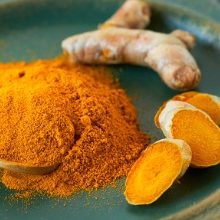Turmeric could have antiviral properties
17 July 2020

Curcumin, a natural compound found in the spice turmeric, could help eliminate certain viruses, research has found.
A study published in the Journal of General Virology showed that curcumin can prevent Transmissible gastroenteritis virus (TGEV) – an alpha-group coronavirus that infects pigs – from infecting cells. At higher doses, the compound was also found to kill virus particles.
Infection with TGEV causes a disease called transmissible gastroenteritis in piglets, which is characterised by diarrhoea, severe dehydration and death. TGEV is highly infectious and is invariably fatal in piglets younger than two weeks, thus posing a major threat to the global swine industry. There are currently no approved treatments for alpha-coronaviruses and although there is a vaccine for TGEV, it is not effective in preventing the spread of the virus.
To determine the potential antiviral properties of curcumin, the research team treated experimental cells with various concentrations of the compound, before attempting to infect them with TGEV. They found that higher concentrations of curcumin reduced the number of virus particles in the cell culture.
The research suggests that curcumin affects TGEV in a number of ways: by directly killing the virus before it is able to infect the cell, by integrating with the viral envelope to ‘inactivate’ the virus, and by altering the metabolism of cells to prevent viral entry. “Curcumin has a significant inhibitory effect on TGEV adsorption step and a certain direct inactivation effect, suggesting that curcumin has great potential in the prevention of TGEV infection,” said Dr Lilan Xie, lead author of the study and researcher at the Wuhan Institute of Bioengineering.
Curcumin has been shown to inhibit the replication of some types of virus, including dengue virus, hepatitis B and Zika virus. The compound has also been found to have a number of significant biological effects, including antitumor, anti-inflammatory and antibacterial activities. Curcumin was chosen for this research due to having low side effects according to Dr Xie. They said: “There are great difficulties in the prevention and control of viral diseases, especially when there are no effective vaccines. Traditional Chinese medicine and its active ingredients, are ideal screening libraries for antiviral drugs because of their advantages, such as convenient acquisition and low side effects.”
The researchers now hope to continue their research in vivo, using an animal model to assess whether the inhibiting properties of curcumin would be seen in a more complex system. “Further studies will be required, to evaluate the inhibitory effect in vivo and explore the potential mechanisms of curcumin against TGEV, which will lay a foundation for the comprehensive understanding of the antiviral mechanisms and application of curcumin” said Dr Xie.
Note to Editors:
Peer reviewed Experimental study Cells
The full research article ‘Antiviral and viricidal effects of curcumin on transmissible gastroenteritis virus in vitro’ is available on the Journal of General Virology website (https://doi.org/10.1099/jgv.0.001466)
The Journal of General Virology is a publication from the Microbiology Society and recognises the importance of virology as a unique discipline within microbiology. The Microbiology Society is a membership charity for scientists interested in microbes, their effects and their practical uses. It is one of the largest microbiology societies in Europe with a worldwide membership based in universities, industry, hospitals, research institutes and schools.
Our principal goal is to develop, expand and strengthen the networks available to our members so that they can generate new knowledge about microbes and ensure that it is shared with other communities. The impacts from this will drive us towards a world in which the science of microbiology provides maximum benefit to society.
For more information, please contact [email protected]
This Press Release has been labelled in-line with The Academy of Medical Sciences’ recommendations.


